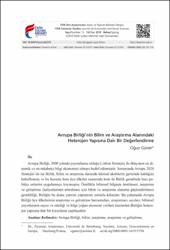Avrupa Birliği’nin Bilim ve Araştırma Alanındaki Heterojen Yapısına Dair Bir Değerlendirme
Citation
GÜNER, Oğuz. ''Avrupa Birliği’nin Bilim ve Araştırma Alanındaki Heterojen Yapısına Dair Bir Değerlendirme.'' FSM İlmî Araştırmalar İnsan ve Toplum Bilimleri Dergisi, 13 (2019): 357-376.Abstract
Avrupa Birliği, 2000 yılında yayımlamış olduğu Lizbon Stratejisi ile dünyanın en dinamik
ve en rekabetçi bilgi ekonomisi olmayı hedef edinmiştir. Sonrasında Avrupa 2020
Stratejisi ile ise Birlik, bilim ve araştırma alanında küresel aktörlerin gerisinde kaldığını
kabullenmiş ve bu hususta hem üye ülkeler nazarında hem de Birlik genelinde bazı politika
setlerini uygulamaya koymuştur. Özellikle bilimsel bilginin üretilmesi, araştırma
ve geliştirme faaliyetlerinin artırılması için bilim ve araştırma alanının güçlendirilmesi
gerekliliği, Birliğin bu alana yatırım yapmasını zorunlu kılmıştır. Bu çalışmada Avrupa
Birliği üye ülkelerinin araştırma ve geliştirme harcamaları, araştırmacı sayıları, bilimsel
yayınlarının sayısı ve niteliği ve bilgi yoğun ekonomi verileri üzerinden Birliğin heterojen
yapısına dair bir kıyaslama yapılacaktır. With the Lisbon Strategy declared in 2000, the European Union aimed to be the most
competitive and dynamic knowledge-based economy in the world. With the European
2020 Strategy later on, the Union accepted that it had fallen behind the global actors in the
area of science and research and implemented certain policy sets for both member countries
and itself. Necessity of empowering the science and research area especially in terms
of production of scientific knowledge and research and development activities made the
Union invest in the area. This study will comparatively elaborate the heterogenic structure
of the Union with the data of member states’ research-development expenditures,
number of the researchers, number and quality of scientific publishing and knowledge
intense economies.



















